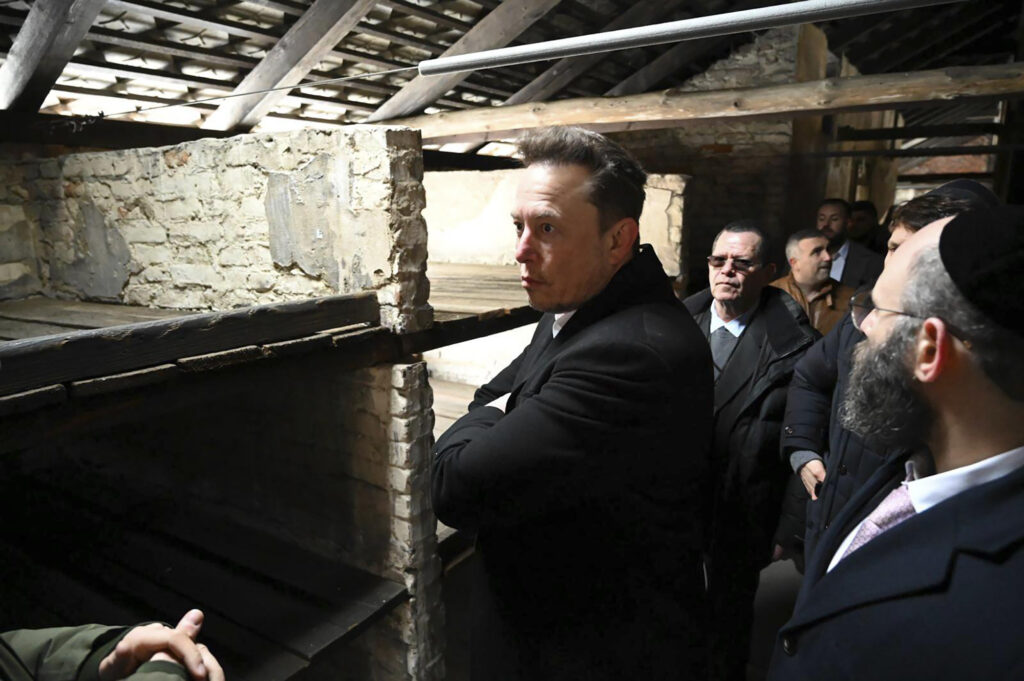In May, Elon Musk mused on his website X that the Marvel villain Magneto, who has a backstory as a child survivor of the Holocaust, reminded him of George Soros, who survived the Holocaust in Hungary as a child. Asked to clarify, Musk replied, “He wants to erode the very fabric of civilization. Soros hates humanity.” Musk’s comments were widely condemned as racist. “This is the language of antisemitism through the ages,” Yair Rosenberg wrote in the Atlantic. And it is. But did Musk know it was?
Once is unfortunate, twice looks like carelessness. Musk didn’t seem to care. On Nov. 15, he endorsed the cryptic musings of a user who calls himself The Artist Formerly Known as Eric. Ex-Eric opined that the Jewish people engage in “the exact kind of dialectical hatred against whites that they claim to want people to stop using against them.” “You have said the actual truth,” Musk replied. This sounds like the language of antisemitism through the ages and in our age in particular.
Again, there was an outcry. The White House called him “abhorrent,” and major advertisers withdrew from X. This time, Musk responded. He went to Israel. Prime Minister Benjamin Netanyahu showed him around a kibbutz where Hamas had slaughtered, raped, and kidnapped Israelis on Oct. 7. On Nov. 28, speaking at the New York Times DealBook Summit, Musk said he was “sorry” for what he called the “worst and dumbest post I’ve ever done.”

He said this, wearing an Israeli dog tag around his neck. It was a gift from Malki Shem-Tov, whose son Omer is a hostage in Gaza. “I will wear it every day until your loved ones are released,” Musk wrote on X. It was necessary, Musk concluded, to “get rid of the ones who are hellbent on murdering Jewish people” and to stop “the sort of propaganda that is convincing people to engage in murder.”
On Jan. 22, Musk toured the death camp at Auschwitz-Birkenau with Menachem Margolin of the European Jewish Association, Ben Shapiro, and the Holocaust survivor Gidon Lev. The historical reality, Musk said, “hits you much more in the heart when you see it in person.” He had, he realized, been “naive” about antisemitism until recently. “In the circles that I move, I see almost no antisemitism,” he told Shapiro. “I have twice as many Jewish friends as non-Jewish friends. I’m like Jewish by association, I’m aspirationally Jewish.” The next day, Musk attended a conference on antisemitism organized by the EJA in Krakow.
There are two ways to look at this. If you’re the New York Times, Musk is faking it. This is a “rehabilitation tour” to woo back the advertisers. Musk went to Auschwitz as “penitence” — as if he’s a war criminal or a German president who can’t have a normal life until the Jews forgive him. That is the view if you think everything is about politics and money. But Musk is not a politician. He is a scientist and businessman, in that order. Your typical businessman invests his wealth and takes up golf. Musk gambles his money with the passion of the scientist seeking an impossible frontier.
While scientific knowledge proceeds by trial and error, politics proceeds by error and denial. The empirical method seeks the truth through observation and correction. The political method uses similar methods, polling, focus groups, and the ideals of “political science,” but it seeks power. If politics is power (Machiavelli) and might is right (Hobbes), then the true politician will never tell the truth. If scientists behaved like this, the Earth would still be flat.
Musk didn’t say, “I’m sorry I hurt your feelings.” He didn’t insult our intelligence like Claudine Gay of Harvard by saying this was “my truth.” He apologized for being wrong. The surge of support on campus for Hamas after the atrocities of Oct. 7 “blew my mind,” he said. “At elite campuses, you are supposed to be enlightened, not sponsoring hate.” The facts changed. Musk, being a scientist, is seeking new facts, seeking to understand the emerging reality. When a scientist owns his mistakes, it’s called a lab report. Trial and error, observation and correction.
Imagine how much healthier democracy would be if our politicians spoke like this. “It was a mistake to shut down the economy in March 2020,” former President Donald Trump says. “I was advised to do it, and it was an emergency, but the buck stops with me. I’m sorry about the economic harm it caused. I also apologize for Jan. 6.”
CLICK HERE TO READ MORE FROM THE WASHINGTON EXAMINER
“I’m sorry I misled you when I said the vaccine would stop you from getting COVID,” President Joe Biden says. “The experts were wrong. I’m going to open every file we have on COVID’s origins so nothing like this happens again and the American people can trust their government. For the same reason, I’m going to fix our election laws so no one can ever doubt the results.”
They could do the right thing, but they won’t. Politicians think they can’t afford it. Elon Musk can afford anything he desires. He also sees why a scientist can’t afford not to do the right thing.
